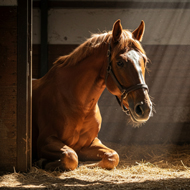Study reveals rate of avian flu transmission
The first human infection from a H9N2-related was reported in Vietnam in April 2024.
A new study has produced the first model on the spread of H9N2, a type of avian influenza, in Asia’s live bird markets.
The researchers say the findings will support future control methods to prevent its transmission, which has been linked to human infection.
The zoonotic virus is generally considered as low pathogenic, causing mild disease which can disrupt poultry production. However, with genes from H9N2 linked to new influenza variants, it has since become a potential pandemic threat.
The first human infection from a H9N2-related virus has already been reported in Vietnam in April 2024.
The Global Challenges Research Fund’s (GCRF) One Health Poultry Hub produced a model to map the speed of avian flu transmission. The research group includes scientists from Royal Veterinary College (RVC), University of Oxford and the University of Hong Kong.
Although previous attempts have been theoretical, this study uses biological data from chickens at live bird markets and a computer modelling system to a calculate transmission rate.
The findings revealed that more than nine in 10 chickens, which have not previously contracted H9N2 influenza, become infected with it after one day in a live bird market. However, one in 10 birds that arrive at these live bird markets have already been exposed to H9N2.
It found that that the time between chickens becoming infected with the virus and becoming contagious could be less than five and a half hours.
In additional research, GCRF One Health Poultry Hub also recorded that two to three in 10 birds in live markets in Bangladesh and Vietnam tested positive for H9N2.
Existing veterinary public health interventions tackle the spread of H9N2 influenza by addressing the disease in live markets. Measures include banning overnight storage of birds, enforced market ‘rest days’ and separated bird species.
The group says that its findings will now inform a new EPIdemic Network Simulation in Poultry Transportation Systems (EPINEST) to map and track virus spread.
Dr Guillaume Fournié, a researcher at RVC, said: “Our research suggests that unless any practical measures designed to protect market traders and shoppers are complemented by interventions in the networks and supply chains that deliver the birds to market – they are unlikely to have enough impact.
“To be successful a pandemic prevention strategy must also target chicken farmers and transporters in countries where the virus is endemic in order to reduce viral burden in markets.”
The study can be found in the journal Nature Communications.
Image © Shutterstock



 Zoetis UK has called on horse owners to complete a short online survey about their horse's behaviours.
Zoetis UK has called on horse owners to complete a short online survey about their horse's behaviours.